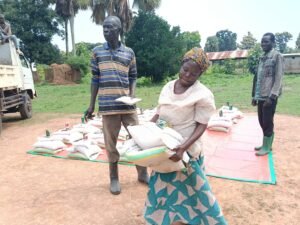By Scopas Bethuel
More than 1,000 smallholder farmers in Yei and Magwi Counties are receiving a major boost as the German government, through GIZ South Sudan, begins distributing high-quality vegetable, legume, and cereal seeds to support food security and increase crop production.
The initiative, implemented by the “Improved Living Conditions and Psychosocial Support (ILiPS)” project, is part of Germany’s broader development cooperation efforts in South Sudan. The distribution, which began this week, comes as farmers prepare for the second crop planting season, a crucial period for achieving good harvests.
At a distribution event held in Gimunu Boma, Yei Town Payam, on June 17, GIZ Agricultural Advisor Emmanuel Anur Towongo highlighted the importance of early planting and the use of certified seeds.
“Access to quality seeds is the beginning of a successful harvest,” Towongo said. “By providing improved varieties, we are making a step toward increasing food production, improving livelihoods, and building a food-secure community.”
Farmers are receiving a mix of nutritious, high-yield seed varieties including maize, soya beans, green grams (mung beans), tomatoes, cabbage, carrots, and onions. In total, GIZ will distribute 10.6 metric tons of maize seeds, 4.6 metric tons of legume seeds, and 0.7 metric tons of vegetable seeds.

A smallholder farmer leaves the distribution site carrying her newly received seeds.
This marks the second round of support to the same group of farmers under the ILiPS project. Last month, they were provided with 5,500 assorted farming tools, such as hoes, pangas, rakes, and axes. The ongoing distributions aim to reduce barriers to accessing essential agricultural inputs and help smallholder farmers increase their productivity.
To complement the physical inputs, GIZ is also broadcasting radio talk shows and spot messages on Good Agricultural Practices (GAP) to bridge knowledge gaps and encourage best farming methods.
The ILiPS project targets returnees, internally displaced persons, and host communities, supporting them with seeds, tools, and training, while also promoting psychosocial well-being and access to support services.
GIZ operates in South Sudan on behalf of the German Federal Ministry for Economic Cooperation and Development (BMZ), focusing on key areas including local governance, rural development, sustainable agri-food systems, water and sanitation, peacebuilding, and gender equality.



